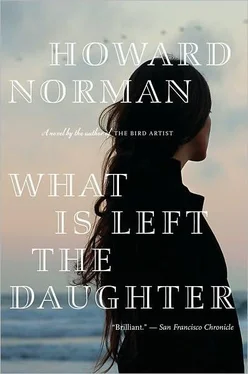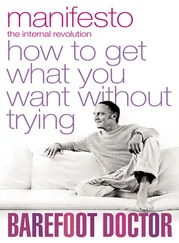"But — and I don't quite know how to ask — is there anything in the Bible, or in Nova Scotia law, that speaks to cousins?"
"Tilda's merely called your cousin, but her being adopted, she's not blood relations, family-tree-wise she's not. I consulted Reverend Witt, and he said — grudgingly, but still — he said even the church recognizes this. Besides, Donald and I might as well be from Mongolia, considering how little Tilda resembles us. Hard not to notice, our features are a world apart."
"I see you've put a lot of thought into this, Aunt Constance."
"What I mean is, ethically, if you have feelings for Tilda, there's leeway. I hadn't felt the urgency to discuss this with you before, Wyatt. Neither had Donald, out in the shed. But now there it is."
"Well, thanks for coming out here, Aunt Constance. Some rescue mission."
"With Tilda, you might also try a divination. Some people believe in them. If a divination doesn't work, nothing happens. If it does work, life changes for the better."
"What'd be a proper divination?"
"Start with something simple. Name your bedposts after the one you love."
"Name my bedposts Tilda Hillyer, is that what you're suggesting?"
"I'm suggesting it can't hurt."
When I looked over, I saw my uncle douse his cigarette by holding it above his head and wagging it a few times in the fog-drenched air. He tossed the butt onto the dock, not into the sea. My uncle wasn't much given to superstition, but he'd warned more than once: never sully the sea, or someday it'll come back at you hard, tenfold.
ON INTO AUTUMN OF 1942, there was, to my mind, a nagging sense of life being off kilter. Temperament-wise, my uncle sported a shorter and shorter fuse, and flare-ups, small and not so small, occurred between us at work, yet most of the time I couldn't figure out the provocation. Still, sleds and toboggans somehow got completed, deadlines were met, paperwork got done. There was, however, a new distance between Uncle Donald and me. Hard to say it right, but it seemed as if my uncle's closest human connection was now with the radio. For example — and this was a complete shock to my aunt and me — Donald didn't join us for dinner two, three or four evenings in a row. Some nights he'd come in so late, Constance would already be asleep. He wouldn't bother to heat up his food. Some nights I'd hear the radio and look in on him. He'd have his ear pressed to the speaker like a safecracker at a lock, except of course it was the tuning dial he turned in the tiniest calibrations.
Not wanting to act the lovesick village idiot anymore, especially in front of Tilda, I tried as best I could to avoid her and Hans. For the most part, this simply meant staying close to home. It helped that I was working such long hours, pretty much dawn to dusk, fairly collapsing after supper. What's more, when I listened to the rest of the house from my bed, I no longer heard the murmur of Tilda's reading from The Highland Book of Platitudes or In a German Pension or any other book. And one night, to my disturbing surprise, I realized I wasn't hearing my uncle's gramophone records, either.
I had to face facts: Tilda was in love with Hans. My aunt's phrase, "her young woman's discoveries," had loud nighttime echoes. Yet I never thought I'd see the day when my uncle stopped listening to Beethoven. I'm sure Constance could've told me where Donald's love for this composer had come from, and why it had persisted, but I had failed to ask her. I have to admit, Quartet No. 9 in C Major and Quartet No. 10 in E-flat Major were my favorites, and all the major symphonies. For Aunt Constance, the absence of gramophone music made her feel bereft. Then one night — and I mean at three A.M. — I heard my aunt's voice, louder than I'd ever heard it or could ever have imagined it. This time it had lost all decorum. It was as if she'd hired a total stranger to shout on her behalf: "You are allowing into our house the wrong Germans out of history, Donald! You're letting the wrong ones into our house!"
"What are you trying to say?" my uncle replied.
"I'm saying, listen to all the war bulletins you want to in your shed. But in the house? Donald, those war broadcasts are all murder, aren't they? All Hitler and death and ships lost at sea. I'm saying Beethoven's not those things."
But my uncle made up his mind differently, and one cold, windy, rainy morning in early October, all of his gramophone records were nowhere to be seen. Not just the Beethoven but his entire collection. "I've looked high and low," my aunt said in great distress. "They're gone." After that, it was exclusively radio programs — standard broadcasts and shortwave — that kept me awake until I couldn't keep my eyes open anymore. Bulletins, updates, casualty tolls, even stories of individual Canadian soldiers. Bleak news, that is, with the occasional reprieve of less bleak news. Static, static, static. My uncle puttering around in the kitchen. My aunt would call him to bed, often with reproach, and he'd respond, "Not yet, there's some news coming in from France," or something along those lines. I'd hear the tea kettle whistling or the coffeepot percolating, the thud of a whiskey bottle set down too hard on the table.
"God forgive me — and keep this to yourself," my aunt said. "Lately it's as if my beloved Donald's become a stranger to me, and we're married thirty-seven years! When I look in on him in the kitchen, often the lights are off. No candles, either. And he's blowing on those glowing radio tubes, when for years Donald has maintained that blowing on those tubes doesn't help the reception one bit."
In the last week of September and up to October 3, my uncle and I completed two sleds and a toboggan. The weather was all lowered clouds, rain threatened, threats realized, the Minas Basin wildly tossing and turning. Here is a sentence from the biographical notes printed on the back of the record album of Beethoven's First and Second symphonies: "During this period he was all too judiciously attended by insomnia." I knew what that meant. And so there we were, Constance, Donald and myself, absent Tilda. No books, no gramophone music. The radio in the shed, the radio on the kitchen table. My uncle listened to the radio in the bedroom too.
At seven A.M., October 5, Donald made a remark about my method of sanding a toboggan plank (it was one of my best skills) that was too critical for me to tolerate, so I drove, three hours earlier than usual, to the bakery to have coffee and a scone. Tilda was there, but not Hans, and I sat with her at a table near the window. "I see you're sitting here alone, without a book to read," I said.
"Hans is upstairs writing his supervising professor a letter," she said. "He keeps tearing it up and starting over. Obviously he hasn't been in classes. He's asking for next semester away from Dalhousie, too. It's called a leave of absence. Problem is, he doesn't want to upset his uncle, whose been so generous. That'll take a separate letter to Denmark. If letters still get there. Hans isn't so sure. He hasn't received one in months."
"And he can't tell this professor the real reason he doesn't want to come back, can he?" I said. "That reason being Tilda Hillyer."
"That's true," Tilda said. "It wouldn't wash."
"Well, if it doesn't work out the way he wants, you could always visit him in Halifax," I said.
"You mean the way we want," Tilda said. "Me and Hans, the way we want it to work out."
"I didn't mean that," I said. "I didn't mean that on purpose."
"Well, you should mean it," she said. "For my sake."
"Nonetheless," I said, "you could visit Halifax."
"Or I could move to Halifax," she said.
Naturally, that little exchange was a far cry from what my aunt had meant by declaring myself to Tilda. Stilted conversation along with no coffee, no scone — that was my breakfast with her. Except that as I was about to leave the bakery, Tilda said, "Wyatt, sit down again, will you?" So of course I sat right down and she cupped my hands in hers. "I need to ask you something. Please try to put aside your feelings toward Hans — or at least try to include my feelings for him — in how you listen to what I've got to say."
Читать дальше












